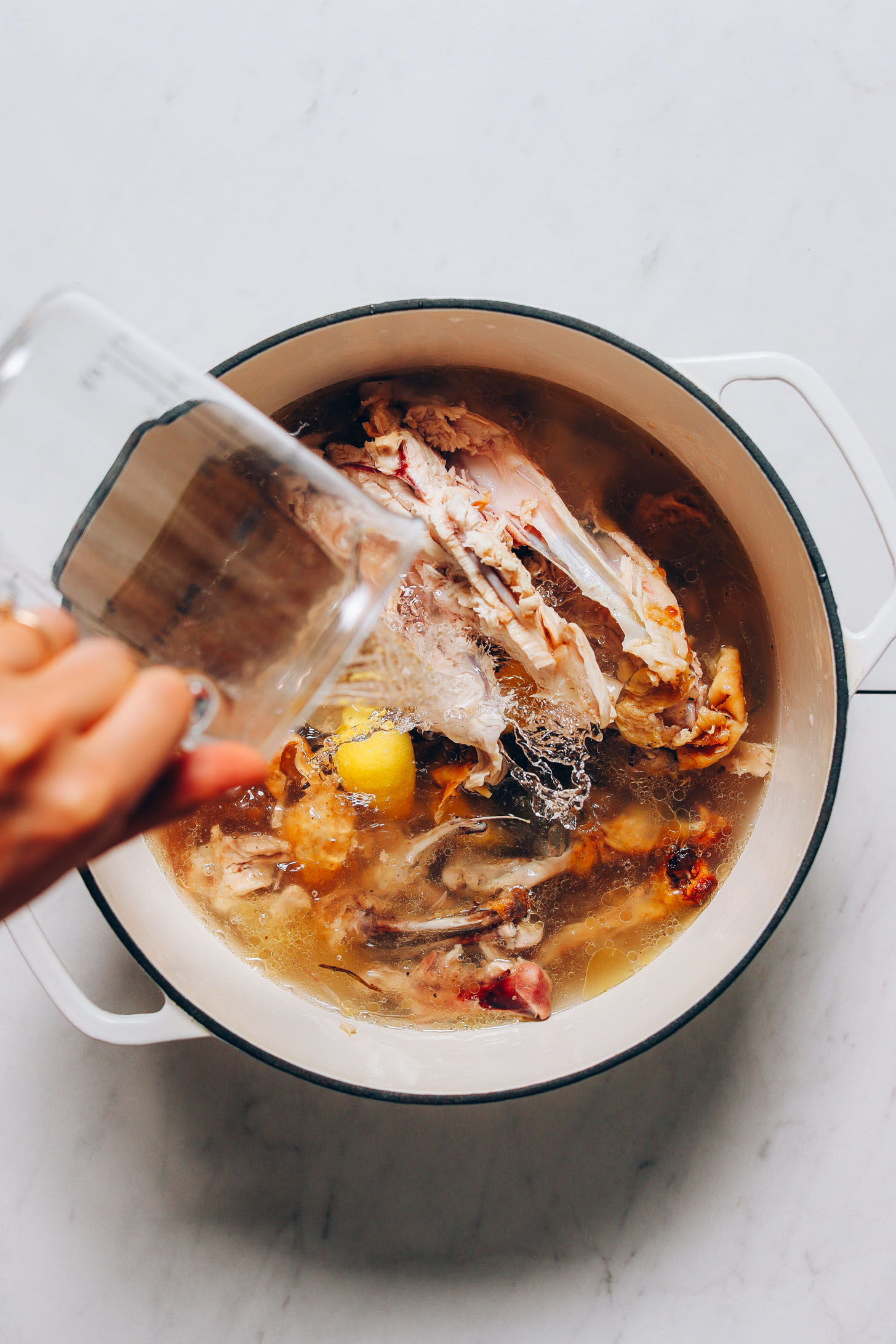Where to buy bone broth for Your Baby—Store vs. Homemade
Where to buy bone broth for Your Baby—Store vs. Homemade
Blog Article
The Value of Healthy Food: Why Bone Broth Is a Great Choice for Babies
Bone broth stands out as a nutrient-dense alternative, supplying vital vitamins and minerals that support development and development. What are the best methods to introduce bone broth to your little one?
Nutritional Perks of Bone Broth for Infants
When you present bone broth to your infant's diet plan, you're offering a nutrient-dense food that uses various wellness benefits. Loaded with essential vitamins and minerals, bone broth includes calcium, magnesium, and phosphorus, which sustain your baby's growing bones. It's likewise rich in collagen, assisting in the growth of healthy and balanced skin, joints, and connective cells.
Additionally, bone broth is an excellent resource of amino acids like glycine and proline, which play a significant role in overall growth and muscle mass development. These nutrients assist advertise a strong body immune system, establishing a solid foundation for your infant's health and wellness.
Additionally, bone broth is very easy to digest, making it a gentle option for your child. By incorporating this wholesome food right into their meals, you're guaranteeing they receive necessary nutrients essential for their overall health. So, go on and make bone broth a staple in your infant's diet regimen!
Just How Bone Broth Sustains Digestion
Bone broth is loaded with necessary nutrients that can really profit your baby's food digestion. It advertises digestive tract health and aids with nutrient absorption, making it an excellent addition to their diet regimen. By incorporating bone broth, you're establishing the phase for a healthier gastrointestinal system.
Nutrient-Rich Structure
One of the most nutrient-rich foods you can introduce to your baby's diet plan is bone broth, which is loaded with vital minerals and amino acids that support healthy food digestion. Rich in collagen, bone broth assists reinforce your infant's digestive tract lining, making it less complicated for their body to take in nutrients. By integrating bone broth right into your baby's dishes, you're giving them a wholesome food that nurtures their gastrointestinal system properly.
Promotes Gut Wellness
As you present bone broth right into your infant's diet plan, you'll locate it not just nourishes yet additionally promotes digestive tract health and wellness effectively. Rich in jelly, bone broth aids calm the gastrointestinal tract, lowering swelling and supporting a healthy gut cellular lining. Additionally, the amino acids located in bone broth, such as glycine, help in digestion and can aid prevent usual tummy difficulties.
Aids Nutrient Absorption
Presenting bone broth not only sustains digestive tract health but additionally plays a significant role in assisting nutrient absorption. When you offer your infant bone broth, you're providing an abundant resource of minerals and amino acids that enhance their gastrointestinal procedures. The jelly in bone broth assists to relieve the gut lining, improving its capability to absorb necessary nutrients.
Strengthening the Body Immune System With Bone Broth

In addition, bone broth consists of glycosaminoglycans, like glucosamine, that can boost the immune system's ability to operate properly. This indicates it not just aids in constructing defenses yet likewise help in recuperation from diseases. By integrating bone broth into your infant's diet regimen, you're providing an all-natural source of nutrition that promotes wellness. So, consider making bone broth a staple in your baby's meals, as it can play a crucial duty in their immune health and development.
Easy Ways to Incorporate Bone Broth Into Child's Diet
Incorporating bone broth into your child's diet regimen can be easy and fulfilling. You can additionally use bone broth as a base for soups or stews that you prepare for the household, guaranteeing your infant gets a preference of scrumptious, healthy and balanced dishes.
If your child takes pleasure in grains, consider cooking rice or quinoa in bone broth rather of water for added nourishment. These methods will assist your child reap the benefits of bone broth effortlessly!
Homemade vs. Store-Bought Bone Broth: What to Choose
Which is better for your infant: homemade or store-bought bone broth? Homemade bone broth provides you full control over the ingredients. You can pick high-grade bones, organic veggies, and herbs, guaranteeing your child gets one of the most nutrients without additives or Check This Out chemicals. And also, making it in your home can be a rewarding experience, allowing you to bond with your baby while preparing wholesome food.
On the various other hand, store-bought choices are hassle-free and conserve you time. Nonetheless, they usually include preservatives and may not match the deepness of taste and nourishment you obtain from homemade broth. If you choose store-bought, seek brand names that are organic and without ingredients.
Eventually, if you have the time and resources, homemade bone broth is the premium selection for your child's health and wellness. If you're short on time, choose a high quality store-bought option as a backup.
Age-Appropriate Bone Broth Serving Tips
As your baby grows, it is necessary to customize bone broth offering recommendations to their developing phase. For infants around six months, begin with a couple of spoonfuls of diluted bone broth. Mix it with water or breast milk to make it much easier for them to absorb. As they become familiar with flavors, you can progressively introduce thicker broth by minimizing the dilution.
By the time your little one is around a year old, consider helpful hints offering bone broth as a standalone drink or blending it into soups and stews. Just make sure to keep the broth reduced in sodium.
Various Other Healthy Foods to Pair With Bone Broth for Infants
When you're wanting to boost the dietary worth of bone broth for your infant, think about combining it with nutrient-dense veggies like carrots and spinach. Whole grain alternatives, such as quinoa or wild rice, can also add structure and fiber. In addition, including healthy and balanced protein resources like shredded chicken or lentils will certainly complete the meal well.

Nutrient-Dense Vegetables
Nutrient-dense veggies are a great enhancement to bone broth for infants, enhancing both taste and nourishment. Incorporating veggies like carrots, spinach, and sweet potatoes can improve the minerals and vitamin content of your broth. Carrots supply beta-carotene for healthy and balanced vision, while spinach is loaded with iron and calcium, necessary for growth. Sweet potatoes include natural sweet taste and are abundant in fiber, aiding food digestion.
You can quickly blend these vegetables right into the broth or serve them as soft, prepared pieces alongside it. This not only introduces new tastes but also urges your youngster to appreciate a range of nutrients. By coupling nutrient-dense veggies with bone broth, you're laying the structure for a healthy diet plan right from the beginning.
Whole Grain Options

Healthy Protein Resources
Bone broth sets wonderfully with numerous healthy protein resources, better improving your baby's diet. Eggs, when presented safely, are one more excellent choice; they're functional and filled with nutrients. By incorporating these healthy protein resources with bone broth, you're giving your infant a well balanced, beneficial dish that supports their development and growth.
Frequently Asked Concerns
Can Bone Broth Cause Sensitive Reactions in Newborns?
Yes, bone broth can cause allergic reactions in infants, especially if they're sensitive to particular active ingredients. Always consult your doctor prior to introducing brand-new foods and display for any kind of indicators of allergic reactions after feeding.
Just How Should Bone Broth Be Kept for Infants?
You need to save bone broth in impermeable containers, either in the refrigerator for up to a week or in the freezer for up to 3 months. chicken bone broth. Always thaw it appropriately before offering to your infant
Is It Safe to Provide Bone Broth to Premature Infants?
It's important to consult your pediatrician before introducing bone broth to early infants. They'll evaluate your child's specific health and wellness demands and ensure it's risk-free, considering their special nutritional demands and developing phase. Always prioritize experienced advice.
What Are the Indications of Intolerance to Bone Broth in Infants?
When introducing bone broth, look for indicators like fussiness, breakout, looseness of the bowels, or vomiting. If your baby shows any one of these responses, it's finest to speak with a doctor before remaining to supply it.
Can Bone Broth Be Used as a Meal Replacement for Newborns?
No, you should not use bone broth as a meal substitute for infants. It does not have essential nutrients needed for their growth. Rather, integrate it into their diet plan along with well balanced dishes for added nutrition and taste.
Report this page